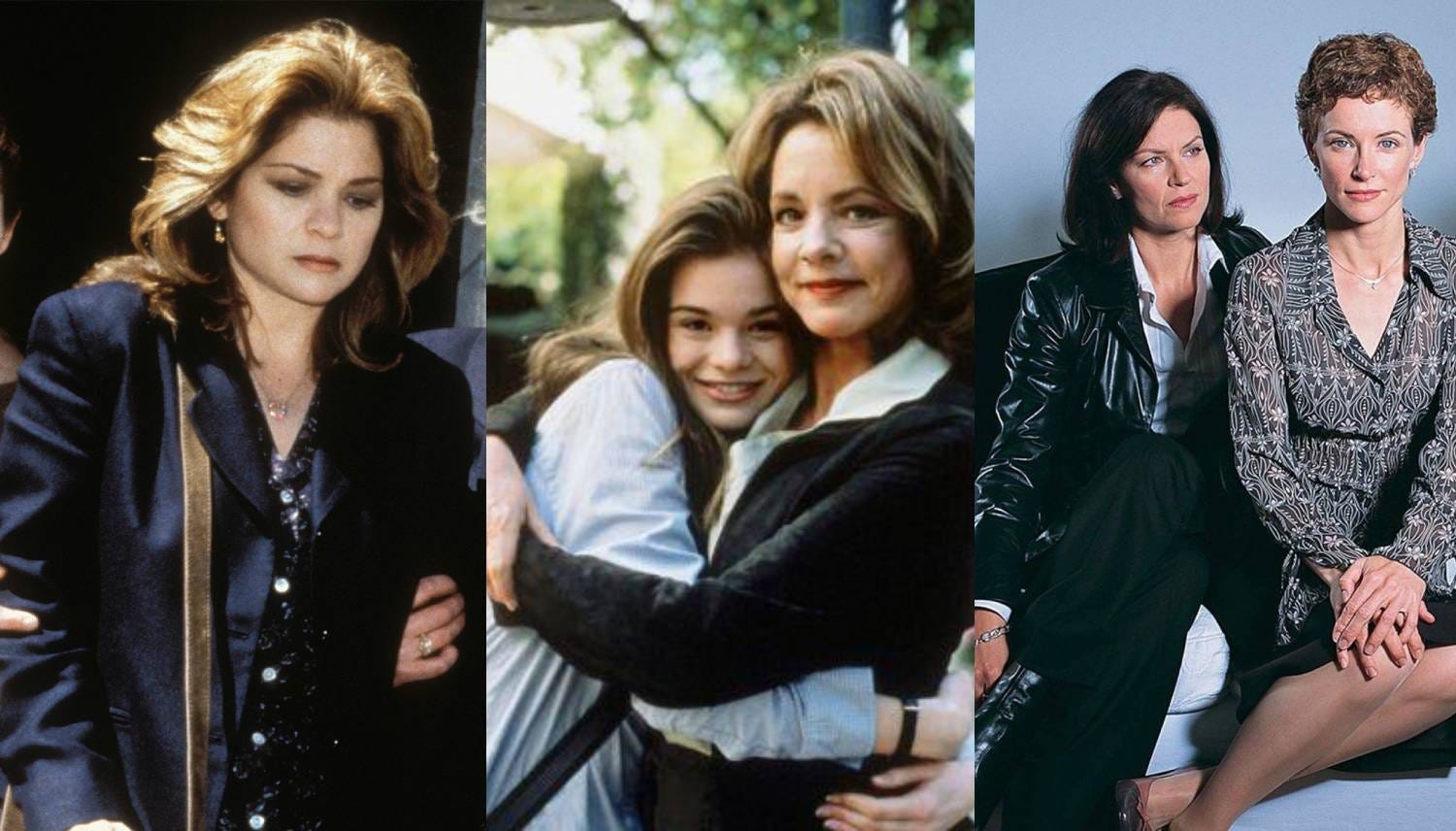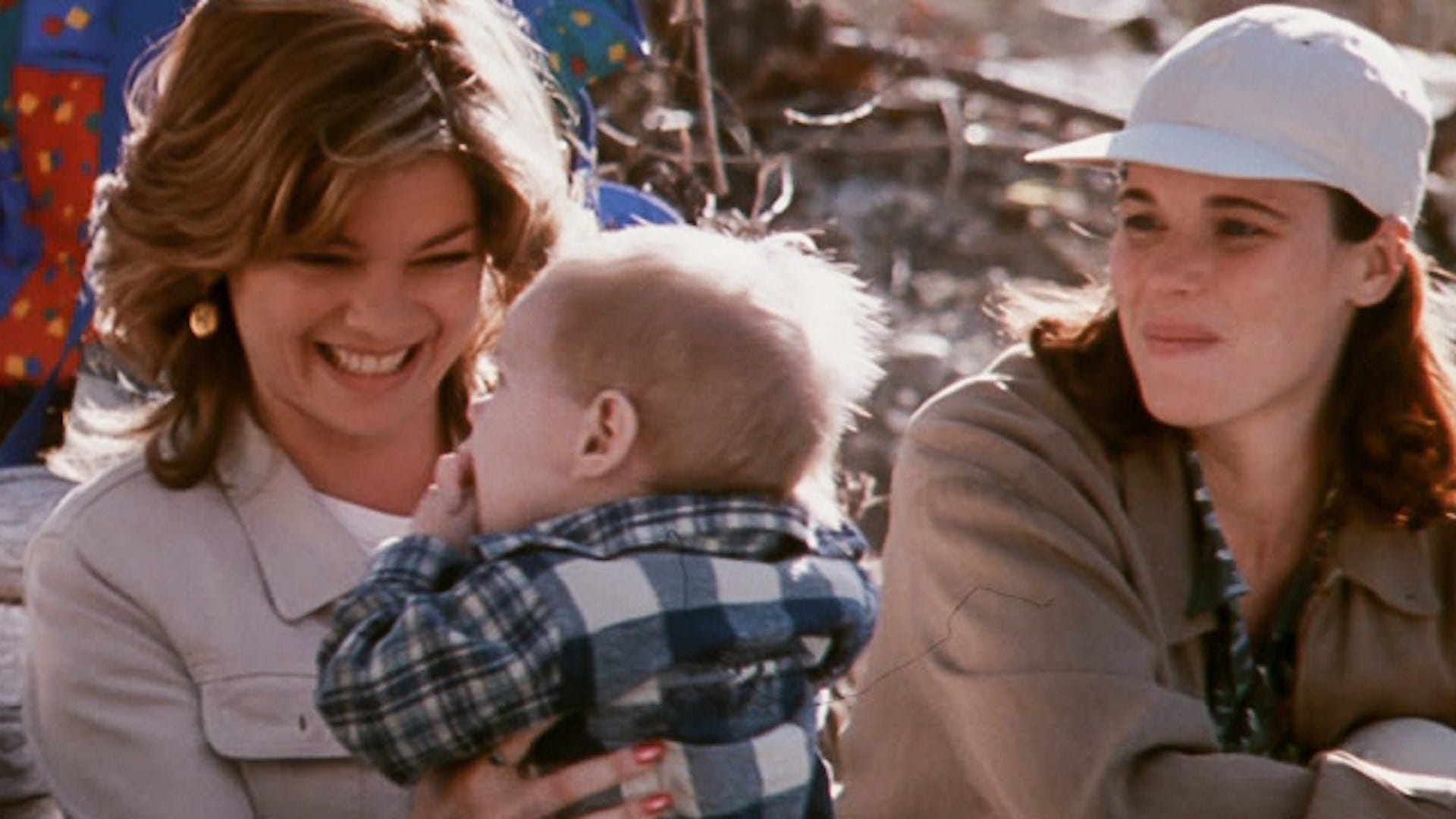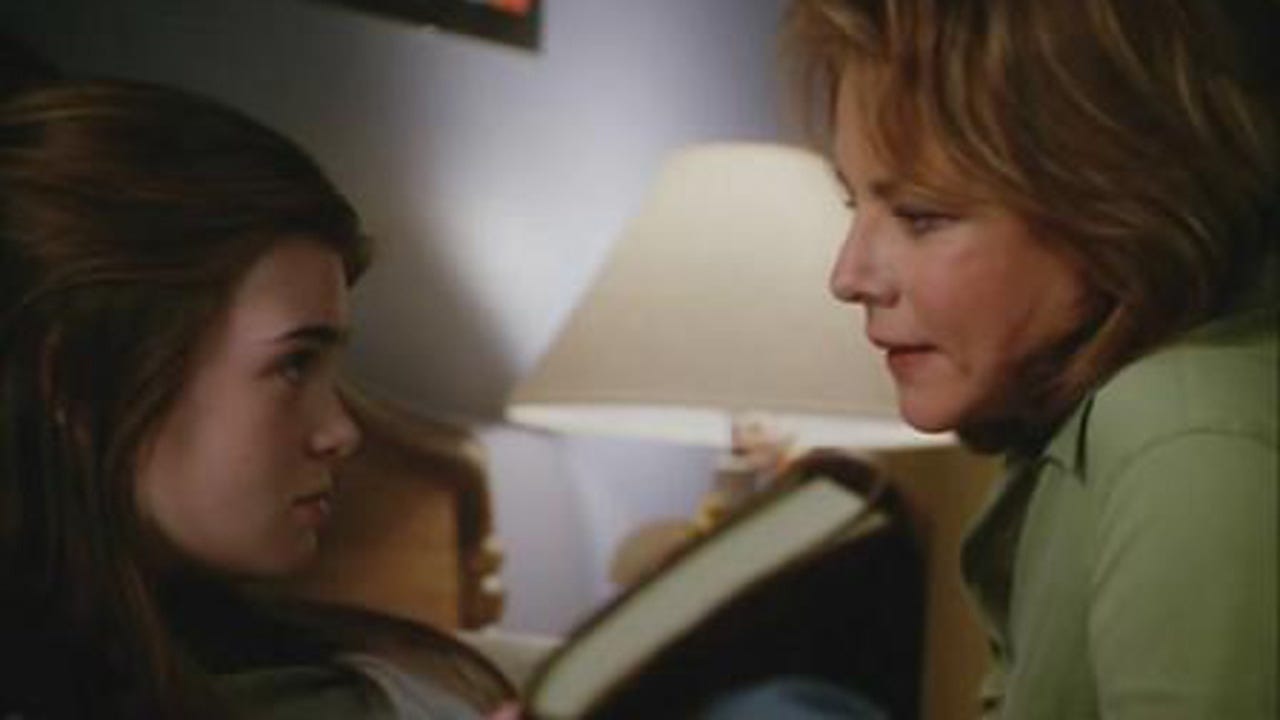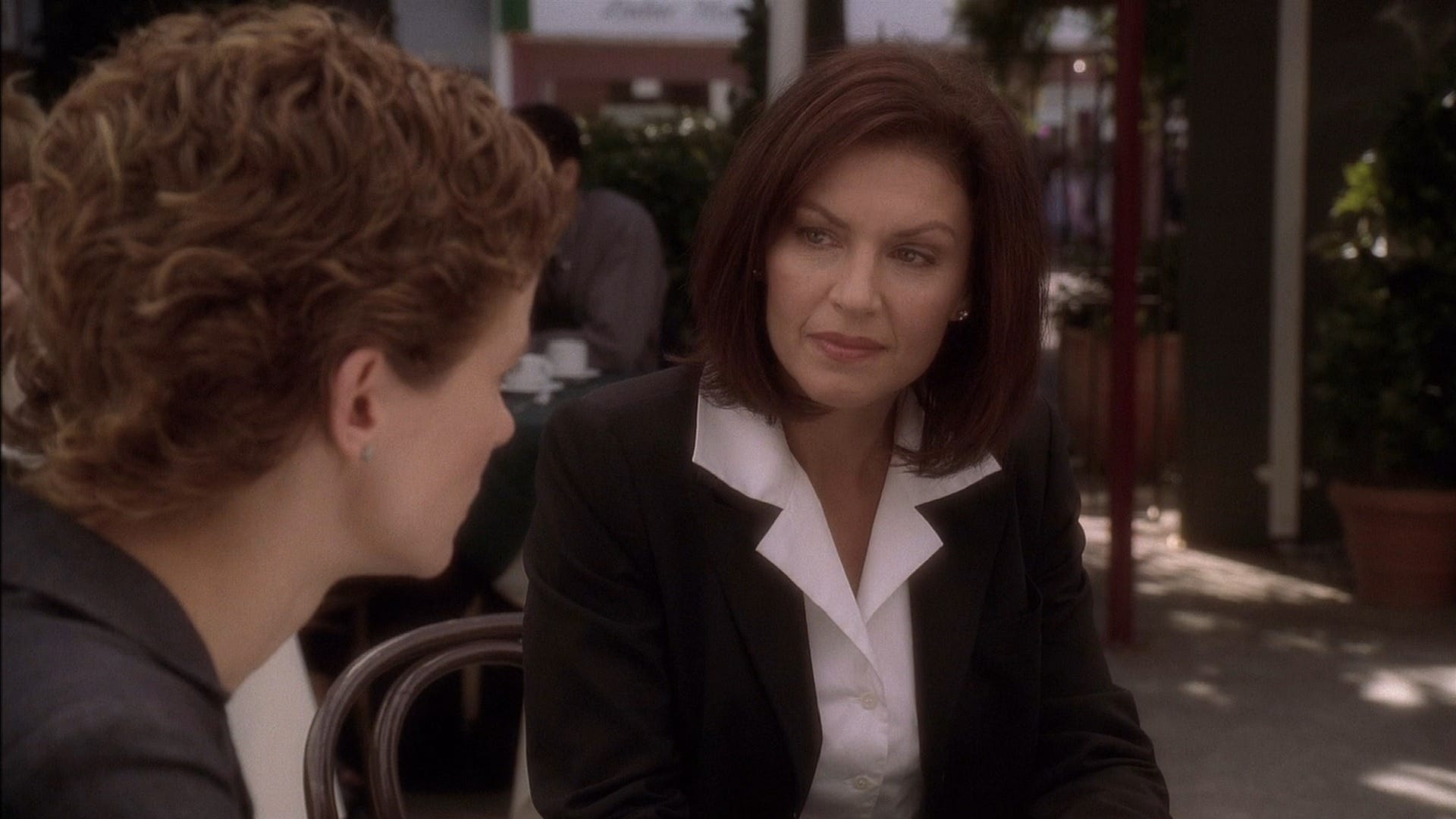The Lesbian TV Movie at the Turn of the Century
This is the Sunday Edition of Paging Dr. Lesbian. If you like this type of thing, subscribe, and share it with your friends. Upgrade your subscription for more, including weekly dispatches from the lesbian internet, monthly playlists, and a free sticker. This post was meant to be sent out on Sunday, so if you got it in your inbox yesterday too, sorry! In our often hazy conception of the past, the TV movie is a maligned form of media, assumed to be unworthy of serious consideration. With the advent of streaming, the distinction between TV movies and movie movies has become irrelevant, even as films with smaller budgets are harder to make. Prior to the streaming age, the TV movie held a unique space in the media landscape. Made with relatively meager budgets, the TV movie could nonetheless reach a large audience, particularly during the 20th century when there were fewer TV channels. These movies sometimes focused on controversial topics bound to spark conversation and boost a network’s ratings.¹ Enter the lesbian TV movie. It’s not surprising that one of the first lesbian TV movies aired on ABC, the network that brought us Afterschool Special, an anthology series still referenced today. Airing from 1973 to 1997, ABC Afterschool Special focused on problems facing children and teens in an effort to educate them on topics like drugs and sex. The existence of LGBTQ people has long been considered a controversial topic, so it tracks that lesbian TV movies have at times followed the format of such educational programming. In 1978, ABC aired a TV movie called A Question of Love, starring acclaimed actress Gena Rowlands. Rowlands plays Linda, a divorced nurse who falls in love and moves in with another woman. When Linda’s shady ex-husband finds out about Linda’s situation he files for custody of their sons – and wins. Based on a real custody case, the film depicts the plight of lesbians in America, though doesn’t go so far as to decisively take their side. This was a period when many Americans had never (to their knowledge) interacted with gays and lesbians before, and thus any mildly sympathetic portrayal of such issues was a step forward. Nearly twenty years later ABC aired another TV movie that depicts a very similar story.² 1996’s Two Mothers For Zachary is based on a custody case that occurred in Virginia in the 1990s. Like A Question of Love, Two Mothers for Zachary stars another acclaimed actress, this time in the role of the villain. Valerie Bertenilli, best known for her role as Barbara on One Day at a Time, plays one of the titular mothers, a young woman named Jody Ann. When her son Zachary is a baby, Jody Ann meets Maggie (Colleen Flynn) and they fall in love. After they move in together and Jody Ann’s mother, Nancy (the legendary Vanessa Redgrave), learns of their relationship, she petitions the court for custody of her grandson. As a review of the film in The Roanoke Times notes, while A Question of Love stopped short of advocating for lesbian parental rights, Two Mothers for Zachary is squarely on the side of the lesbians and makes a point to call out Virginia’s archaic legal code. Bertinelli gives the film much of its pathos. Due to her role as an adolescent on a beloved sitcom – and her perpetually cheery demeanor – Bertinelli was something of an American sweetheart, which means audiences were primed to be on her side.³ (It also meant taking a role such as this was something of a risk.) Her Jody Ann is both immanently likable and courageous – an everyday heroine for the small screen. Redgrave is perfectly awful as her bigoted mother, even if she occasionally forgets she’s meant to be putting on a Southern accent. To be sure, the first half of the film is more pleasant to watch than the second half. Jody Ann and Maggie’s quiet romance is sweet, even if it isn’t explored as fully as it could be. The couple have one fairly chaste kiss at Christmas, in addition to a blink-and-you'll-miss-it smooch in the rain, in keeping with the standards of queer sexuality on screen at the time. Nonetheless, Jody Ann’s insistence on standing up for herself and who she is – and the fact that she’s clearly a better mother with Maggie than without her – paints her lesbian identity as something that gives her strength rather than a passing fling. The latter half of the film is filled with courtroom drama and Big Questions about morality and social norms. Both sides get their chance to give dramatic speeches about why their position is the correct one, laying out the issues at hand without much subtlety. While it might seem more interested in teaching its audience than entertaining it or composing great beauty, there is a clarity to the movie’s message that must have had an impact. (The film won a GLAAD award for Outstanding Made for TV Movie.) Unfortunately, the movie may have hurt the real-life Jody Ann, a woman named Sharon Mattes. Her participation in the film was used against her in court, as the judge argued that she and her partner were using the case for publicity. Sharon never regained custody of her son and gave up fighting in 1996, after which she never gave another interview. The film leaves Zachary’s fate up in the air, with a postscript indicating that Jody Ann (or Sharon) continues her fight. The movie suggests that Jody Ann is unable to reconcile her new life as a lesbian with her old one – the divide between the gay world and the straight (read: homophobic) one is too wide. Her best friend doesn’t want to hang out with her anymore and says she’s changed; her mother hates her. This theme continues to crop up as the lesbian TV movie enters the new millennium. In the year 2000, Lifetime aired the lesbian TV movie that contemporary viewers are probably most familiar with. Written and directed by lesbian filmmaker Lee Rose, The Truth About Jane follows a 16-year-old girl who realizes she’s a lesbian and subsequently has a dramatic falling out with her mother. Like the two films that came before, The Truth About Jane stars yet another iconic Hollywood actress – Stockard Channing, who had just begun starring in The West Wing at the time. Channing plays Janice, Jane’s (Ellen Muth) overbearing mother, who is initially obsessed with Jane but later grows to resent her. Janice’s best friend Jimmy is played by none other than RuPaul, one of two sage older gay characters that help Jane through her difficult coming-out process. Out of the three lesbian TV movies from this period, The Truth About Jane feels most like an episode of Afterschool Special, in part due to its adolescent focus. Jane is an average white teenage girl whose entire world changes when she meets and falls in love with her classmate Taylor (Alicia Lagano). Though much of the film tracks how other people react to Jane’s queerness, we are given an intimate look at Jane and Taylor’s relationship. They even have sex, though the scene is far from explicit. While an uncharitable viewer might describe it as a paint-by-numbers coming-out story, it’s notable that Jane stands in her truth even after her relationship with Taylor runs its course – it was never about Taylor, after all. Another of the movie’s messages: being gay is not a choice. If it’s a harsh review you’re looking for, look no further than Variety, which described the film as “one long lecture series.” To give the movie credit, The Truth About Jane tries to put us in the shoes of a young lesbian in the year 2000, complete with a (somewhat cheesy) voiceover and all. The story is nothing new to queer people, but it was certainly a first for Lifetime. Every character serves a very clear symbolic purpose. RuPaul’s character Jimmy says things like “Honey, I'm black and I'm gay. They hate me way more than they'll ever hate you” and exists to illustrate that plenty of people think they’re open-minded until their family members are gay. (Jimmy is also the only black character in any of these films, which all focus on homophobia – and queerness – within white communities.) Jane learns that her favorite teacher, Ms. Walcott (Kelly Rowan), is a lesbian, and she becomes Jane’s closest confidant and the only person able to get through to her stubborn mother. Like Jody Ann in Two Mothers for Zachary, Jane quickly learns about the incompatibility of the straight world and the gay one. In one of the movie’s best lines, Ms. Walcott asks Jane what’s wrong and she cries “I’m gay and everyone hates me!” The central message of the film is about tolerance. Though it must’ve been a meaningful film for young queer people at the time – comedian Fortune Feimster says the film made her realize she’s gay – the ultimate moral of the story is aimed at parents. The latter half of the film follows Janice as she rails against Jane’s rebellious “choice” and eventually comes to an uneasy acceptance of her daughter. She attends PFLAG meetings and tries to respect Jane’s identity, but admits she’s still struggling with it. The viewer is advised to be tolerant of gay people, and Janice’s hateful response serves as a cautionary tale about how deeply parents can hurt their children. Despite its didactic form and the fact that it’s far from timeless, there’s something compelling here. Sometimes people do need to be taught, and sometimes there’s comfort in wholesome conventions. Indeed, tolerance can be life-saving. The film is dedicated to Matthew Shephard, who less than two years earlier was murdered for being gay. For modern viewers, this certainly puts things into perspective. In 2001, Lifetime hopped on the custody battle train with the film What Makes A Family. Brooke Shields and Cherry Jones play Janine and Sandy, a lesbian couple who have a child together. When Sandy dies several years after giving birth, her parents sue for custody of the child, while Janine fights for her parental rights. Janine ultimately wins the custody battle after her lawyer proves how much Sandy loved Janine and wanted them to be a family. Barbara Streisand and Whoopie Goldberg served as executive producers on the film, which, like those before it, dramatized national debates about lesbians’ place in society. After the success of The Truth About Jane – it was nominated for a GLAAD award, a SAG award, and a WGA award – Lifetime asked Lee Rose to make a lesbian film with more adult themes. The result was 2003’s An Unexpected Love, which follows a housewife who falls in love with a lesbian co-worker. Leslie Hope plays Kate, a woman nearing forty who has just separated from her husband. In the midst of an existential crisis, Kate goes to work at a real estate office where she meets the alluring Mac (Wendy Crewson, who played the mom in the ‘90s classic Better Than Chocolate). Mac is an out lesbian, and one of the most enjoyable aspects of the film is her early 2000s business dyke outfits, complete with numerous blazers and tiny sunglasses. The beloved American actress in An Unexpected Love is gay rights supporter Margo Martindale, who plays Mac’s sardonic but sympathetic coworker. Kate and Mac strike up a friendship that turns into something more, though Mac initially rebuffs Kate’s advances, arguing that Kate doesn’t really know what she’s getting into (she’s not wrong). This conflict is one of the most interesting aspects of the film, and some of the dialogue here is more nuanced than you might expect from a Lifetime movie. Hope and Crewson are both charming in their roles, though the film regrettably doesn’t spend as much time on their relationship as some viewers might hope. After they get together, most of the film focuses on what other people think of their relationship, much like the two films that preceded it. It follows a common narrative of the time, illustrating the divide between the gay and straight worlds but painting an optimistic picture of reconciliation. Despite Lifetime’s initial proposal to Rose, there were struggles to get it made. The very brief sex scene in the film was supposed to be longer but the network had it cut. Speaking about this edit, Hope argued that "In the bigger picture, it's more important that the movie get done. We got in a lot.” For example, Lifetime wanted the film to have a sad ending, but Rose fought for a happy one and won. Getting two actors to star in the lead roles was also difficult, as Rose noted many actresses balked at the idea of playing a lesbian. (Wendy Crewson, who plays Mac, publicly came out as a lesbian a decade later.) Ultimately, the film’s message is right there on the surface. But, in case you missed it, Rose declared that An Unexpected Love and The Truth About Jane “are about one thing and one thing only – that you should have the right to love whoever you want." While they have dramatic narratives, the films aim to teach audiences something about the world – aims that detractors would say make them overly preachy. Though created by a lesbian, this message is directed at straight viewers who might not understand the gay perspective. As Rose put it, "It's about tolerance. You fall in love with a person, you don't fall in love with a sex." These films haven’t quite stood the test of time, both in terms of their contemporary cultural standing and their pasé moral preoccupations. But to be fair, these movies aren’t primarily concerned with being artful or abstract in their beauty. They were trying to make a point, and the populist forum of the TV movie was the perfect venue to do so. Winning people over when it comes to controversial issues is no small feat, and witnessing how such arguments are made within mass media can be instructive. Whether it’s Valerie Bertinelli standing up for lesbian autonomy or Stockard Channing getting inside the mind of a bigoted parent, these movies played a significant role in the media’s imagining of lesbian stories. Though not as elegant as the lesbian movies we’ve come to expect in recent years, they have a place in our lesbian history. 1 Two Mothers for Zachary, The Truth About Jane, and What Makes a Family are all streaming on Tubi. An Unexpected Love is streaming on Amazon Prime with a Lifetime Movie Club subscription (or free trial). There is a low-quality version of A Question of Love on YouTube. 2 In 1995, one year before Two Mothers for Zachary, NBC aired Serving in Silence: The Margarethe Cammermeyer Story, which stars Glenn Close as a lesbian in the military. 3 In their review of the film, The Washington Post writes “Bertinelli can't disguise her magnificent cuteness, but she rises well above it with an unimpeachable performance,” which is a very strange compliment but gives you a sense of how she was seen at the time. You’re a free subscriber to Paging Dr. Lesbian. For the full experience, which includes weekly dispatches from the lesbian internet, become a paying subscriber. Your support means a lot! |
Older messages
The Lesbian TV Movie at the Turn of the Century
Saturday, February 24, 2024
Lesbians Teaching Tolerance ͏ ͏ ͏ ͏ ͏ ͏ ͏ ͏ ͏ ͏ ͏ ͏ ͏ ͏ ͏ ͏ ͏ ͏ ͏ ͏ ͏ ͏ ͏ ͏ ͏ ͏ ͏ ͏ ͏ ͏ ͏ ͏ ͏ ͏ ͏ ͏ ͏ ͏ ͏ ͏ ͏ ͏ ͏ ͏
free evelyne brochu
Thursday, February 22, 2024
and stop zach braff ͏ ͏ ͏ ͏ ͏ ͏ ͏ ͏ ͏ ͏ ͏ ͏ ͏ ͏ ͏ ͏ ͏ ͏ ͏ ͏ ͏ ͏ ͏ ͏ ͏ ͏ ͏ ͏ ͏ ͏ ͏ ͏ ͏ ͏ ͏ ͏ ͏ ͏ ͏ ͏ ͏ ͏ ͏ ͏ ͏ ͏
Apple TV+ Cornered the Market on Lesbians in Sci-Fi
Monday, February 19, 2024
Or, otherworldy gay shows ͏ ͏ ͏ ͏ ͏ ͏ ͏ ͏ ͏ ͏ ͏ ͏ ͏ ͏ ͏ ͏ ͏ ͏ ͏ ͏ ͏ ͏ ͏ ͏ ͏ ͏ ͏ ͏ ͏ ͏ ͏ ͏ ͏ ͏ ͏ ͏ ͏ ͏ ͏ ͏ ͏ ͏ ͏ ͏
The Lesbian Legacy of 'ER'
Sunday, February 11, 2024
Or, Queer As Emergency
5 Lesbian Films You Probably Haven't Seen
Sunday, February 4, 2024
A jaunt around the globe
You Might Also Like
How Worried Should We Be About These Measles Outbreaks?
Tuesday, March 4, 2025
Today in style, self, culture, and power. The Cut March 4, 2025 HEALTH How Worried Should We Be About These Measles Outbreaks? Cases have been popping up across the country. We asked a pediatrician to
Starting Next Week: A New Course on Wordsworth
Tuesday, March 4, 2025
Class starts March 13. Enroll today. Upcoming Literary Seminar: Timothy Donnelly on William Wordsworth Dive into the work of one of England's most influential poets. In this three-session seminar
An update on how Trump’s proposed tariffs could raise food costs
Tuesday, March 4, 2025
A Michelin-starred chef backpedals after disparaging retweets
The Best Memes & Tweets About The 2025 Oscars
Tuesday, March 4, 2025
Plus: Ariana Grande's Oscars performance had a hidden meaning. • Mar. 4, 2025 Up Next Your complete guide to industry-shaping entertainment news, exclusive interviews with A-list celebs, and what
Red Hot And Red
Tuesday, March 4, 2025
What Do You Think You're Looking At? #204 ͏ ͏ ͏ ͏ ͏ ͏ ͏ ͏ ͏ ͏ ͏ ͏ ͏ ͏ ͏ ͏ ͏ ͏ ͏ ͏ ͏ ͏ ͏ ͏ ͏ ͏ ͏ ͏ ͏ ͏ ͏ ͏ ͏ ͏ ͏ ͏ ͏ ͏ ͏ ͏ ͏ ͏ ͏ ͏ ͏ ͏ ͏ ͏ ͏ ͏ ͏ ͏ ͏ ͏ ͏ ͏ ͏ ͏ ͏ ͏ ͏ ͏ ͏ ͏ ͏ ͏ ͏ ͏ ͏ ͏ ͏ ͏ ͏ ͏ ͏ ͏ ͏ ͏
What to Watch For in Trump's Abnormal, Authoritarian Address to Congress
Tuesday, March 4, 2025
Trump gives the speech amidst mounting political challenges and sinking poll numbers ͏ ͏ ͏ ͏ ͏ ͏ ͏ ͏ ͏ ͏ ͏ ͏ ͏ ͏ ͏ ͏ ͏ ͏ ͏ ͏ ͏ ͏ ͏ ͏ ͏ ͏ ͏ ͏ ͏ ͏ ͏ ͏ ͏ ͏ ͏ ͏ ͏ ͏ ͏ ͏ ͏ ͏ ͏ ͏ ͏ ͏ ͏ ͏ ͏ ͏ ͏ ͏ ͏ ͏ ͏ ͏ ͏ ͏
“Becoming a Poet,” by Susan Browne
Tuesday, March 4, 2025
I was five, / lying facedown on my bed ͏ ͏ ͏ ͏ ͏ ͏ ͏ ͏ ͏ ͏ ͏ ͏ ͏ ͏ ͏ ͏ ͏ ͏ ͏ ͏ ͏ ͏ ͏ ͏ ͏ ͏ ͏ ͏ ͏ ͏ ͏ ͏ ͏ ͏ ͏ ͏ ͏ ͏ ͏ ͏ ͏
Pass the fries
Tuesday, March 4, 2025
— Check out what we Skimm'd for you today March 4, 2025 Subscribe Read in browser But first: what our editors were obsessed with in February Update location or View forecast Quote of the Day "
Kendall Jenner's Sheer Oscars After-Party Gown Stole The Night
Tuesday, March 4, 2025
A perfect risqué fashion moment. The Zoe Report Daily The Zoe Report 3.3.2025 Now that award show season has come to an end, it's time to look back at the red carpet trends, especially from last
The FDA Just Issued a Recall on a Supplement — Because it Contains an ED Drug
Monday, March 3, 2025
View in Browser Men's Health SHOP MVP EXCLUSIVES SUBSCRIBE The FDA Just Issued a Recall on a Supplement — Because It Contains an ED Drug The FDA Just Issued a Recall on a Supplement — Because It




